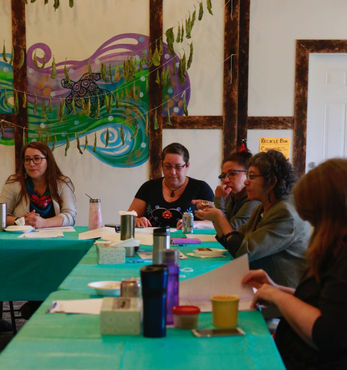
Storytelling Methods for Disrupting Harmful Narratives
Working together to elevate the respectful incorporation of storytelling approaches within health research to disrupt harmful narratives and promote equity
Our Story
We call upon the federal government, in consultation with Aboriginal peoples, to establish measurable goals to identify and close the gaps in health outcomes between Aboriginal and non-Aboriginal communities
TRC Call to Action #19
This call demands action to close the gap in health disparities; however, there is a troubling history of research being done on instead of with Indigenous peoples and failing to address their priority healthcare needs. Storytelling can privilege Indigenous’ voices and oral traditions, create spaces to share holistic knowledge, and invite community involvement. Given the importance of storytelling for Indigenous peoples, there is a clear need to elevate storytelling in health research and provide guidance on respectful ways to incorporate storytelling methods.
To address this need, in an early project we engaged First Nations women in an exploration of Indigenous women’s experiences of breast cancer using digital storytelling. Together we assessed the feasibility, meaningfulness, and appropriateness of using digital storytelling to explore their breast cancer experiences. We found that this novel approach created an ethical space for genuine patient engagement, and facilitated a Debwewin journey, which is an ancient Anishinaabe way of knowing that connects one’s heart knowledge and mind knowledge.
“My people will sleep for one hundred years, but when they awake, it will be the artists who give them their spirit back
– Louis Riel
Projects
Based on the participants’ feedback, and the findings of a systematic review on digital storytelling, we embarked on a research project in which the workshop participants joined as full research team members. Our collaborative team of Indigenous and non-Indigenous researchers, and Indigenous patients, Elders, healthcare providers, and administrators, conducted a critical, participatory, scoping review to identify and examine how storytelling has been used as a method in Indigenous health research on Turtle Island (i.e., Canada and the United States), Australia, and Aotearoa (New Zealand). We found a diverse array of storytelling approaches and adaptations in the 178 included articles, along with exemplary practices and problematic omissions. Storytelling could honour Indigenous ways of knowing, being, and doing when done in a good way, but it could also result in several challenges when researchers did not meaningfully engage with Indigenous communities.
Building on these scoping review findings, we developed a framework for the respectful use of storytelling in health research that involves partnerships of Indigenous and non-Indigenous people. This framework provides important considerations and guidance for designing respectful storytelling research studies to decolonize health research. As well, we evaluated the included studies with the 4Rs of respect, responsibility, relevance, and reciprocity. Our team members shared meanings of these four concepts from their Indigenous languages and we formulated revised definitions tailored to our team’s location and health research, and identified associated research practices and concrete examples in our included studies to guide future storytelling research.
Our partnerships and these findings will serve as essential precursors to future storytelling research projects and collaborations. Our ultimate goal is advancing evidence which meaningfully incorporates Indigenous perspectives, practices, and priorities into the Canadian healthcare systems to impact health and wellbeing and benefit Indigenous communities. Paying careful attention to how this knowledge is elucidated and where it is grounded is critical to pursuing this worthy goal.
Meet the team
See the dedicated team that is particiating in this project
























